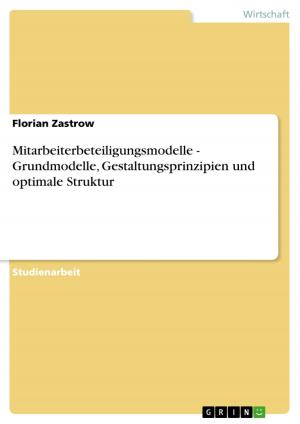The concept of 'Homo Economicus' and Experimental Games
Is 'Homo Economicus' still alive today?
Nonfiction, Religion & Spirituality, Philosophy| Author: | Merve Gülacan | ISBN: | 9783668202832 |
| Publisher: | GRIN Verlag | Publication: | April 22, 2016 |
| Imprint: | GRIN Verlag | Language: | English |
| Author: | Merve Gülacan |
| ISBN: | 9783668202832 |
| Publisher: | GRIN Verlag |
| Publication: | April 22, 2016 |
| Imprint: | GRIN Verlag |
| Language: | English |
Essay from the year 2015 in the subject Philosophy - Practical (Ethics, Aesthetics, Culture, Nature, Right, ...), grade: 2,3, University of Kassel, language: English, abstract: The findings of research in experimental behavioural economics over the past two decades have been impressively convincing. Until recently, economists assumed that individual behaviour is controlled by rationality. The consumer was perceived as a rational person who strives to maximize his utility. This is the concept of homo economicus, a prototype of an economic person and starting point for model formulation. However, this theory often overlooks the fact that homo economicus is not a person of flesh and blood, but a conceptual notion. Experimental evidence shows that the behaviour forecast by the standard model often does not correspond to reality. Factors like fairness, trust and moral values also play a role in the decision-making of the real economic actor. The knowledge gleaned from the observation of different negotiation plays provides the possibility for the derivation and representation of individual behaviour patterns. But the studies' findings reveal that feelings of fairness, generosity and trust play a crucial role for the results. The object of this work is to find an answer to the question if homo economicus is still alive or not. Therefore I will consider different experiments of the dictator game from the literature. Experimental games offer good possibilities for the representation and derivation of individual behaviour patterns. Chapter 2 presents the concept of homo economicus and describes his properties. Chapter 3 deals with experimental games, with the major focus being on the dictator game. Individual studies will be presented. The last chapter concludes.
Essay from the year 2015 in the subject Philosophy - Practical (Ethics, Aesthetics, Culture, Nature, Right, ...), grade: 2,3, University of Kassel, language: English, abstract: The findings of research in experimental behavioural economics over the past two decades have been impressively convincing. Until recently, economists assumed that individual behaviour is controlled by rationality. The consumer was perceived as a rational person who strives to maximize his utility. This is the concept of homo economicus, a prototype of an economic person and starting point for model formulation. However, this theory often overlooks the fact that homo economicus is not a person of flesh and blood, but a conceptual notion. Experimental evidence shows that the behaviour forecast by the standard model often does not correspond to reality. Factors like fairness, trust and moral values also play a role in the decision-making of the real economic actor. The knowledge gleaned from the observation of different negotiation plays provides the possibility for the derivation and representation of individual behaviour patterns. But the studies' findings reveal that feelings of fairness, generosity and trust play a crucial role for the results. The object of this work is to find an answer to the question if homo economicus is still alive or not. Therefore I will consider different experiments of the dictator game from the literature. Experimental games offer good possibilities for the representation and derivation of individual behaviour patterns. Chapter 2 presents the concept of homo economicus and describes his properties. Chapter 3 deals with experimental games, with the major focus being on the dictator game. Individual studies will be presented. The last chapter concludes.















